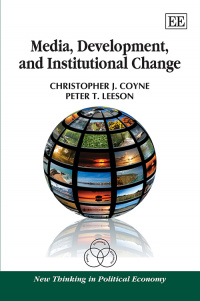Hardback
Media, Development, and Institutional Change
Media, Development, and Institutional Change investigates mass media’s profound ability to affect institutional change and economic development. The authors use the tools of economics to illuminate the media’s role in enabling and inhibiting political–economic reforms that promote development.
More Information
Critical Acclaim
Contents
More Information
Media, Development, and Institutional Change investigates mass media’s profound ability to affect institutional change and economic development. The authors use the tools of economics to illuminate the media’s role in enabling and inhibiting political–economic reforms that promote development.
The book explores how media can constrain government, how governments manipulate media to entrench their power, and how private and public media ownership affects a country’s ability to prosper. The authors identify specific media-related policies governments of underdeveloped countries should adopt if they want to grow. They illustrate why media freedom is a critical ingredient in the recipe of economic development and why even the best-intentioned state involvement in media is more likely to slow prosperity than to enhance it.
Scholars and students of economics, political science and sociology; policy-makers, analysts and others in the development community; and academics in media studies will find this book insightful and provocative.
The book explores how media can constrain government, how governments manipulate media to entrench their power, and how private and public media ownership affects a country’s ability to prosper. The authors identify specific media-related policies governments of underdeveloped countries should adopt if they want to grow. They illustrate why media freedom is a critical ingredient in the recipe of economic development and why even the best-intentioned state involvement in media is more likely to slow prosperity than to enhance it.
Scholars and students of economics, political science and sociology; policy-makers, analysts and others in the development community; and academics in media studies will find this book insightful and provocative.
Critical Acclaim
‘Media, Development, and Institutional Change is substantively about the relationship between the media and economic development. But in the course of pursuing this issue, Coyne and Leeson also present the clearest exposition yet in print of the “New Comparative Political Economy”, of which the book itself also constitutes an excellent example. This fact alone makes the book worth reading for all economists interested in the market process and institutional change, regardless of whether or not they are interested in the particular subject of the role of free media in development.’
– Nicholas Adam Curott, Review of Austrian Economics
‘I highly recommend the book. Economists interested in development, public choice and the media will all find that Coyne and Leeson have made a valuable contribution. If economists over the next decade make headway on how to grow the institutions of the market economy, I suspect we will recognize in retrospect that Coyne and Leeson have identified in the media an important channel for institutional reform.’
– Daniel Sutter, Public Choice
– Nicholas Adam Curott, Review of Austrian Economics
‘I highly recommend the book. Economists interested in development, public choice and the media will all find that Coyne and Leeson have made a valuable contribution. If economists over the next decade make headway on how to grow the institutions of the market economy, I suspect we will recognize in retrospect that Coyne and Leeson have identified in the media an important channel for institutional reform.’
– Daniel Sutter, Public Choice
Contents
Contents: 1. The Big Picture: Media, Development, and Institutional Change 2. The Reformers’ Dilemma 3. The Determinants of Media Effectiveness 4. Inside the Black Box: Media Freedom, Political Knowledge, and Participation 5. Case Studies of Media, Institutions, and the Reformers’ Dilemma 6. Conclusion – Implications for Policy Index
